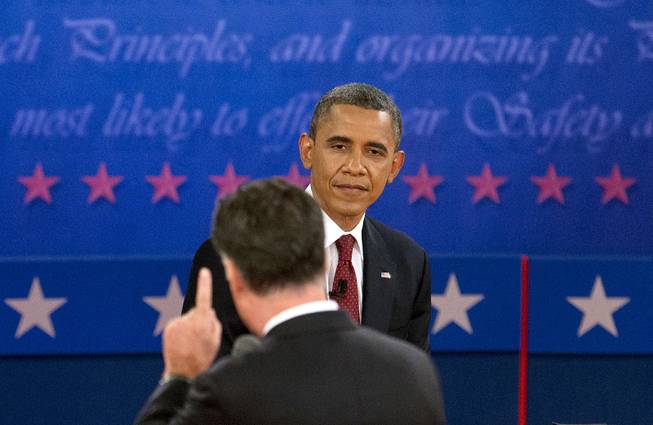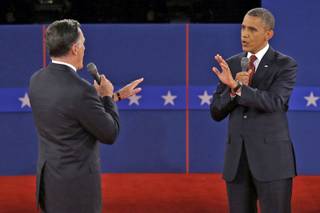
ASSOCIATED PRESS
President Barack Obama, right, and Republican presidential candidate Mitt Romney participate in the second presidential debate, Tuesday, Oct. 16, 2012, at Hofstra University in Hempstead, N.Y.
Published Tuesday, Oct. 16, 2012 | 4:20 p.m.
Updated Tuesday, Oct. 16, 2012 | 10:30 p.m.
Tuesday night’s presidential town hall debate was a chance for President Barack Obama and his Republican rival Mitt Romney to answer voters’ questions face to face.
But it also became an opportunity for the candidates to get in each other’s faces as they directly accused one another of everything from shifting their positions to outright lying on the debate floor.
Oftentimes circling one another as if pitted together in a boxing ring, Romney and Obama fought extensively about how to characterize each other’s energy policies. They ripped each other up over the arithmetic of their tax plans. They appeared to nearly physically challenge each other when the conversation turned to immigration, and their efforts to stare each other down over Libya brought an icy pall to the Hofstra stadium.
The result: A debate that wound up more fiery than their first and required both candidates to more forcefully defend their own records and proposals while savaging their opponent’s.
“The commitments I’ve made, I’ve kept. And the commitments I haven’t been able to keep, it’s not for lack of trying,” Obama said. “The choice of this election is going to be whose promises will more likely help you.”
“The policies he’s put in place from Obamacare to Dodd-Frank ... these policies combined have not let this economy take off and grow as it should have,” Romney said about Obama. “He’s great as a speaker and describing his plans and his vision, and that’s wonderful, but we have a record to look at.”
The free-wheeling style of the debate highlighted the extent to which this was an existential fight, but it also delivered a few new revelations on underaddressed topics that could swing undecided voters this close to the election.
The debate got off to a meandering start. A question about job opportunities for graduating college students led both candidates to offer expansive presentations of their economic plans. A second question on whether the government can affect gas prices inspired a somewhat tedious back and forth on energy investments and the bailout of Detroit’s automotive industry.
But the conversation quickly became combative — and more focused — when the debate turned to candidate’s respective tax plans.
Obama relaunched his charge that Romney’s tax plan would add $8 trillion to the deficit and force him to raise taxes on the middle class.
“We haven’t heard from the governor any specifics beyond Big Bird and eliminating Planned Parenthood in terms of how he pays for that,” Obama argued, turning to Romney. “If somebody came to you with a plan that said here, ‘I want to spend $7 or $8 billion and then we’re going to pay for it, but we can’t tell you until maybe after the election how’ ... you wouldn’t take such a sketchy deal. And neither should you, the American people, because the math doesn’t add up.”
“Of course they add up,” Romney retorted. “I was someone who ran businesses for 25 years. I ran the Olympics and balanced the budget, I ran the state of Massachusetts as a governor ... and balanced the budget all four years.
“When we’re talking about math that doesn’t add up, how about $4 trillion of deficits over the last four years, $5 trillion? That’s math that doesn’t add up,” he said.
Romney noticeably did not offer more details to counter the president’s accusations, save for one: That he intends to offset whatever losses in revenues are incurred under his tax plan by capping possible itemized deductions at “I’ll pick a number — $25,000.”
Romney first floated this idea on the eve of the first presidential debate, but offered a different number for the cap: $17,000. That — or whatever figure Romney eventually settles on — represents the cumulative cap on home mortgage interest, employer-sponsored health care, child tax, charitable donations and other tax deductions that anyone could claim on an annual tax return.
“But your rate comes down and the burden also comes down on you for one more reason, and that is every middle-income taxpayer no longer will pay any tax on interest, dividends or capital gains, and no tax on savings,” Romney said, defining a middle-income taxpayer as persons earning up to $250,000. “That makes life a lot easier.”
It’s a potentially critical conversation for the voters of Nevada, where homes are underwater and many families rely on certain middle-class focused tax credits to make ends meet.
According to the Tax Policy Center, the $17,000 cap and even the $25,000 cap would end up adversely affecting at least some of the income earners Romney defines as “middle class,” because they often claim more than that in tax writedowns — particularly in home mortgage interest and employer-sponsored health care benefits.
Conversely, Romney's suggestion to eliminate taxes on capital gains, interest and dividends for middle-class earners presumes most have capital to invest. Typically, a middle-class family’s largest investment is their home — and capital gains from most home sales are waived for the middle class already.
Obama has also floated a plan to limit tax deductions based on net rates, rather than caps. Under Obama’s plan, top income earners would not be allowed to claim deductions that reduced their effective tax rate to less than 28 percent.
But Obama kept quiet about that on Tuesday night, arguing instead that Romney’s tax plan favors the rich and will eventually force him to turn to the middle class for revenues.
Equally important for many Nevada voters are the differences Romney and Obama drew on immigration: Obama favors a pathway to citizenship for some undocumented immigrants, especially young college students and military enlistees who came to the country as minors, while Romney favors a pathway to permanent residency for those who would enlist in the military and a policy of self-deportation for the rest.
Romney used the opportunity to take a jab at Obama for failing to pass comprehensive immigration reform early in his term. As Obama complained that Republicans stood in the way of the bill, Romney piped up, “I’ll get it done in the first year.”
That wasn’t the only unexpected event of the night. In response to a question about gun control, Obama declared his support for banning assault weapons, an answer that gave Romney an opportunity to make an easy play for the gun-toting voters.
Instead, however, Romney pivoted to the role of two-parent households in preventing gun violence.
“But let me mention another thing — and that is parents. We need moms and dads, helping to raise kids, wherever possible,” he said. “But gosh, to tell our kids that before they have babies, they ought to think about getting married to someone, that’s a great idea.”
Romney also fumbled an opportunity to hammer Obama on his answer to a question about who was responsible for the security lapse in Libya that resulted in the American ambassador’s assassination on Sept. 11.
“The president just said that on the day after the attack, he went into the Rose Garden and said that this was an act of terror ... It was not a spontaneous demonstration, is that what you’re saying?” Romney said, staring down a noticeably agitated Obama who told him, tight-lipped, to proceed.
”I want to make sure we get that for the record because it took the president 14 days before he called the attack in Benghazi an act of terror,” Romney said.
Moderator Candy Crowley jumped in to say Obama did refer to the attack as an “act of terror” the day after the attack.
Various lawmakers have accused Obama of trying to avoid accusations he mishandled security in Libya by blaming what is now known to have been a coordinated attack on protesters angry over an anti-Muslim video.
Romney lost the point in the crosstalk and Obama seized the moment to assume the full poise of the presidency. Obama told Romney it was “offensive” to suggest he “played politics,” adding with an air of finality: “I’m the president, and I’m always responsible.”
Control of the atmosphere and the conversation was as much an issue in this debate as in the first.
Romney strove to police the flow of the back-and-forth, arguing at several points with Crowley over his allotted time to speak. He also delayed answering new questions in order to jump back to an old topic.
That stylistic choice meant that Romney sometimes delivered noticeably inexact answers to very specific questions, such as when he responded to a question on equal pay for women with an anecdote about how hard it had been for him to find women willing to apply for jobs in his gubernatorial administration.
Obama, too, was guilty of pulling the occasional dodge. But for the most part, Obama strove to avoid the pitfalls of his last debate, refusing to give as much ground to Romney as he did the first go-round.
Whether Obama rescued the momentum of his campaign from his lackluster performance in the first debate will be revealed by public polling in coming days — especially in swing states such as Nevada. And with early voting starting in Nevada on Saturday, the debate was a last chance for both candidates to sway many voters in the Silver State.
The third and final debate, on foreign policy, is Oct. 22.


Join the Discussion:
Check this out for a full explanation of our conversion to the LiveFyre commenting system and instructions on how to sign up for an account.
Full comments policy